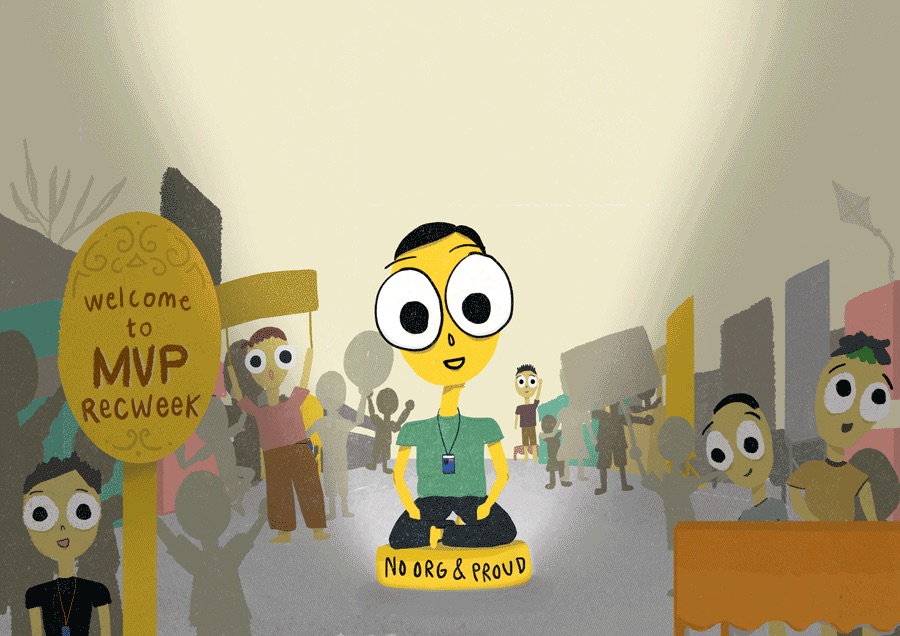The Atenean org culture is present everywhere from the dancing mobs of OrSem to the flood of social media blasts on Sunday nights and the buzz of tambay week activities in the SEC foyers.
The Loyola Schools is a mélange of 53 accredited organizations and many more that are independent. It is reasonable to say that there is an org for just about any interest. This vibrant org culture has even given birth to the term “BS Org”—used to describe students who are ardently active in organizations, whether one or many.
The org life
Ymara Yap, a member of three orgs, is one of these students. The Ateneo org culture is so longstanding and deeply ingrained that Yap says her excitement to join orgs was sparked by the stories of her sister, Bianca Yap (BS CTM ’14). Yap adds that one of her fondest memories is her first RecWeek. It allowed her to immerse herself in groups that were passionate about their fields. “[W]hether [those fields] be advocacies [the orgs] feel strongly about, interests they want to explore, and even skills they want to develop,” she shares. Perhaps it was this strong first impression that solidified her commitment to the Atenean org life.
More than stories from alumni or exciting RecWeeks, perhaps Ateneo as a training ground for the “real world” demands org involvement as well. “We’re made to believe that grades aren’t the only thing job recruiters are looking for, so I feel like there’s a lot of pressure to do [more] and excel in orgs,” says Ginny Añonuevo, a management engineering senior. Añonuevo found herself in four orgs in her freshman and sophomore years, but has since limited her org involvement.
Jonathan Gregorio, a legal management senior and a member of three orgs, says the reasons students join orgs vary. Himself having many reasons for joining orgs—because his friends were members, he liked the advocacies, and even out of pure instinct—he says that the reason people stay is more important than the reason they join.
The middle ground
Gregorio also admits that org involvement can get tiring. For him, however, it’s a good kind of tired. “Exhaustion is just another hurdle to go past before you make a difference,” he says. He believes that coming back to why you joined an org helps one remember why you devote effort into it.
Sometimes, however, these things can be achieved by knowing when you’ve had enough. Like Añonuevo, Carmela Fortuna, a communications technology senior, was heavily involved in org work in her early years in Ateneo but has since detached herself from the org life. “I felt I accomplished everything I wanted to in them,” she adds. Now she is focused on developing her relationships with friends and family, since org involvement took up a lot of her time.
For Neil Dy, also a communications technology senior and previously a member of three orgs, this realization came slowly. Dy found himself too busy with other pursuits to continue his involvement in orgs. “It’s not all about the orgs. [A]s long as you’re passionate about your career, big things can happen,” he shares. Now regularly booking brand endorsements and photoshoots, Dy proves that one can find one’s self outside the Ateneo org culture.
Despite this, some students choose to keep ties with their orgs—but only a limited amount. Añonuevo, for example, now only involves herself in org projects that she finds meaningful. “I really look at the description of the projects and the roles available to see if I can use the skills I’ll learn [from working on the projects] in the future,” she explains.
Although they eventually decided to leave their BS Org lives, Añonuevo, Dy, and Fortuna all see some good in their involvement with orgs. “It’s important to at least experience it,” Dy says. If orgs are supposed to help you find yourself and what’s important to you, then maybe students dedicating their time to other matters shows that the orgs have done their jobs.
Org-less
Añonuevo, Dy, and Fortuna agree that it’s a good decision to join orgs even if you might eventually leave them. Adrian San Juan, however, might disagree. “I’m indifferent towards the org culture of Ateneo,” San Juan says. San Juan joined orgs in his freshman year but was not compelled to participate in any projects. “At times it seemed like orgs would only entertain you if you had resources that could benefit them,” San Juan adds.
With the hundreds of students crowding RecWeek each year, it might be difficult to imagine that some students simply choose not to devote their time to a particular organization inside the Loyola Schools. Atenean orgs cater to all kinds of interests, but maybe some interests cannot be institutionalized. Even when they can be, perhaps Atenean org life is simply incompatible with how some Ateneans live their lives.
“Ateneo has a very strong organization culture…[but] I wanted to have the time to enjoy college life while still being able to focus on academics,” says Patricia Menchaca. Menchaca joined three orgs in her freshman year but quickly realized the org life was not for her. She notes the difficulty to commit to orgs and attend meetings, especially when “these meetings were more of just [kwentuhan] sessions.”
Without meetings, events, and promo blasts to worry about, Menchaca and San Juan have plenty of time at their disposal. “Given that I have no other commitments, I can manage my time for accomplishing things more flexibly,” Menchaca says.
The culture and the individual
Orgs allow students to explore their interests and talents. They are avenues for students to learn about themselves and grow. On top of this, orgs have also become known as stepping stones towards careers and spaces for expanding social networks. While all of these are true, we should also remember than the organizations of the Loyola Schools are not the only avenues that can enable one to grow. Other students explore their passions outside of the university through internship opportunities and freelance work.
The org culture in campus is difficult to miss, but that also makes it easy to get lost in. One or more of the orgs in Ateneo may definitely be fit for you. Perhaps an org will fit you for a while, and then no longer. Maybe you don’t even want to join one—that’s perfectly fine.
Ultimately, the org culture in Ateneo is dependent on the individual. It will continue to dominate social media news feeds and campus walkways only as long as students like Yap and Gregorio thrive in it. Should a student feel that they do not thrive in the org culture, they can learn from those like Dy or Menchaca and realize that’s alright. We owe it to ourselves to find where we can best grow, be it in orgs or out of them.






